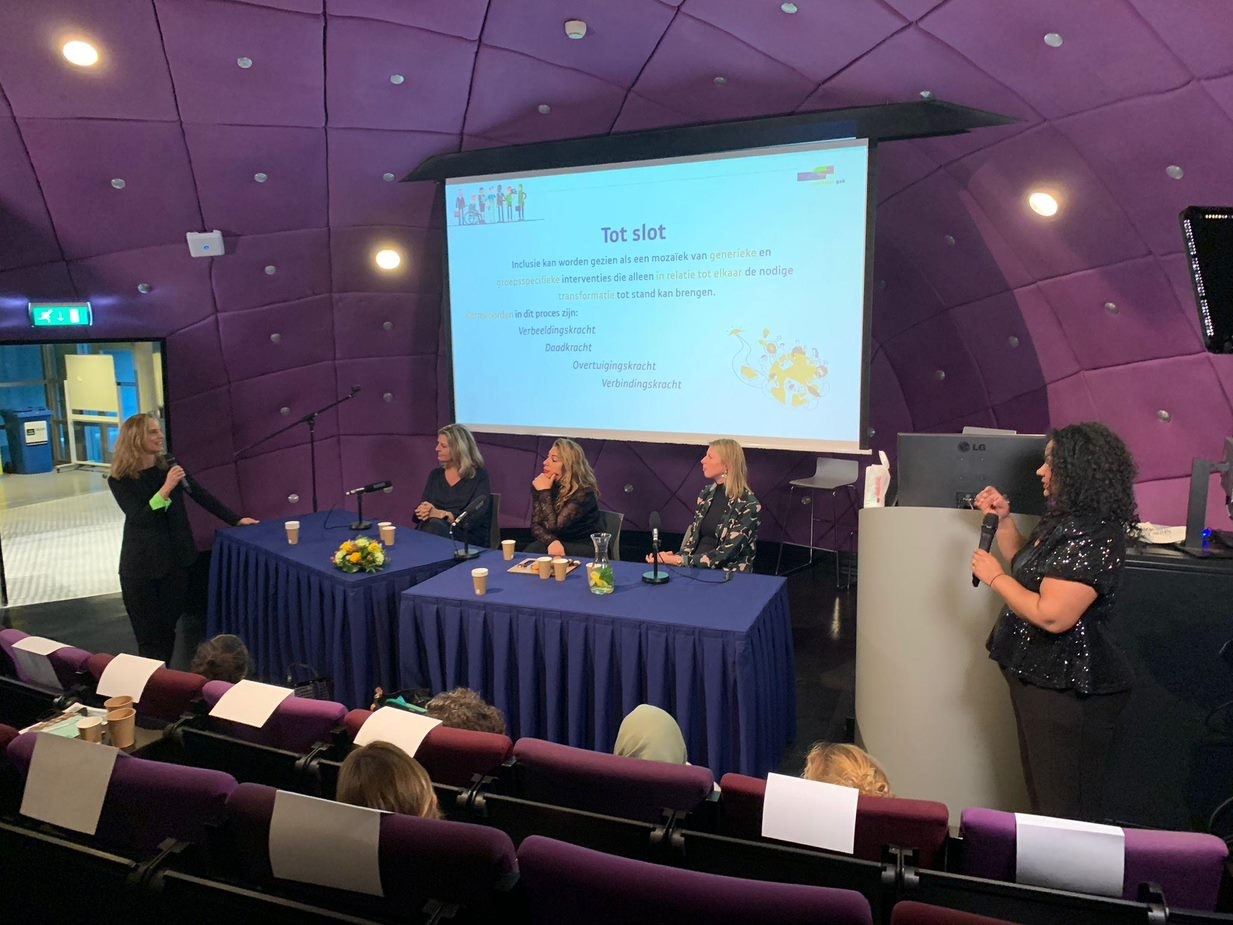Many employers consider diversity and inclusion to be important values to strive for. However, their good intentions often result in only limited progress towards creating a work environment where everyone has equal opportunities for advancement. Why does this happen and where are the opportunities for improvement? A research team from Hogeschool Inholland and Vrije Universiteit Amsterdam presented their two-year study on November 25th.
Over the past two years, a team led by Professor Machteld de Jong (Diversity Issues) and Professor Halleh Ghorashi (Diversity and Integration) has conducted research on the inequality of opportunities in the job market. What sustains this inequality and how can it be overcome? On Thursday, November 25th, the researchers presented their findings during the final conference “Towards an Inclusive Work Environment! Insights from Work and Life Experience and Paradoxes from Practice.”
Pedagogical Influence
Mieke van den Berg, member of the board at Inholland, broadens the theme of an inclusive work environment. “It’s also about progressing towards an inclusive society. Just like Inholland, employers also have a pedagogical influence. Together, we can collaboratively work on this through research.”
COVID-19: Returning to the ‘Standard Employee’
During the research, Machteld experienced the paradox of wanting to work on an inclusive work environment but not actually doing so. “We were hit by the COVID-19 crisis. The organizations we conducted the research with faced challenging times. Their reflex was to revert to the ‘standard employee,’ because they ‘didn’t want to take risks.'”
From Two Perspectives
The research was conducted in co-creation with the involved employers so that they could also learn throughout the process. The researchers delved into their perspective: whom do they view as less privileged groups in the job market and what are they doing for inclusion and diversity? Additionally, the research focused on the perspective of individuals who do not belong to the category of standard employees. What are their experiences with exclusion, and what can organizations do about it in their view?
Addressing Institutional Bias
By juxtaposing both perspectives, the institutional bias became evident: organizations claiming to be inclusive and people who don’t experience it as such. “This came to light in five paradoxes linked to five specific groups,” says Halleh. “Black Dutch individuals, Islamic Dutch, refugees, LGBTQ+ Dutch individuals, and Dutch individuals with disabilities.” According to Halleh, organizations are in a position to address this bias with a mosaic of generic and specific interventions. “Through imagination, determination, persuasion, and connectivity, we can achieve transformation.”
“We were confronted with the COVID-19 crisis. Organizations faced challenging times. Their reflex was to revert to the ‘standard employee,’ because they ‘didn’t want to take risks’.” – Machteld de Jong, Professor of Diversity Issues.
Panel Discussions
After the presentation, lively panel discussions took place, moderated by host Sarita Bajnath and several members of the research team, interspersed with inspiring performances by writer and performer Babs Gons and musician Isaac Bullock. For the first panel, which could provide a scientific response to the research, Claartje Vinkenburg, Ismintha Waldring (both from Vrije Universiteit Amsterdam), and Sjiera de Vries (Hogeschool Windesheim) took their seats.
Action-Oriented Research Helps
“It’s great that the research focuses on paradoxes,” Claartje says. “Organizations can make those paradoxes explicit and discuss them openly.” Sjiera agrees. “The research brings forward the mechanisms through stories of what we think and want on one hand, and what we actually do on the other. That step towards action often stalls. This action-oriented research helps to get things moving.” According to Ismintha, a possible next step is to look at organizations where inclusion does work. “It’s not about emphasizing that people are different but giving them space to be themselves. For example, by providing a place for prayer and making food suitable for everyone.”
14 Percent Less Pay
For the second panel, which delved into the practical question of how we can create the most impact with this research, Emma Lok (WOMEN Inc.), Yesim Candan (publicist and speaker), and Jacqueline Prins (Social and Economic Council (SER)) participated. According to Emma, addressing the gender pay gap starts with raising awareness, such as providing statistics. “Women earn on average 14 percent less than men. How do you ensure that you translate that difficult message and engage in discussions about it at different levels, from politics and the broader public to individual employers?”
Role of the SER
14 percent less? Yesim sees it as a severe form of discrimination. “I write a lot about diversity. That it’s beneficial for organizations to reflect society and that it enhances creativity. Diversity should be a business model.” Jacqueline is also advocating for it with the SER. “We’ve developed advice that mandates gender diversity at the top for listed companies. So, we have a systemic impact. But even the SER itself is not diverse enough as an organization. For instance, with our own collective labour agreement (CAO), we’re trying to change that, with arrangements like leave for LGBTQ+ families and including non-Christian holidays as days off.”
Report Presented
Finally, Jacqueline was presented with the research report. “Because you’re currently and have been committed to this issue,” says Halleh. “It’s time to share knowledge and stories and to collaboratively work within a learning network. It would be fantastic to broaden efforts beyond gender diversity and address the paradoxes highlighted in this research.”
Below is a recording of the conference “Towards an Inclusive Work Environment!” held on Thursday, November 25, 2021.
Interested in learning more about the research? The report can be downloaded here. Also, check out the article based on the report published on socialevraagstukken.nl.


